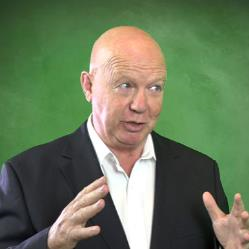 "The cost of pursuing business we cannot win is huge" - discussion with John Smibert.
"The cost of pursuing business we cannot win is huge" - discussion with John Smibert.
 I recently heard Tony Hughes state that we need to "lose fast and win slow". This sounds counter intuitive. In this discussion I challenge him to explain what he meant.
I recently heard Tony Hughes state that we need to "lose fast and win slow". This sounds counter intuitive. In this discussion I challenge him to explain what he meant.
"The cost of pursuing business we cannot win is huge" Tony explains. "The damage is the credibility of the salesperson, it drags the resources of the organisation, it damages motivation, and then there's a big opportunity cost; while we're pursuing the things we can't win, we're not focusing on those that we can.
Tony went on to explain that if we enter an opportunity late we need to decide quickly if we can win it and if not walk away gracefully.
The better way is to strategically - and more slowly- sell by engaging early at senior levels, help people build a business case, create that awareness that they need to change state, find the mobiliser and help affect change.
See Tony's full interview where he provides some wonderful insight for sales leadership and their salespeople on what they need to do to successfully win slow and achieve sustainable growth in sales, revenue and profitability.
************
Tony is a leading author and keynote speaker in the world of B2B sales and sales leadership. He is well known for his strategic selling book "The Joshua Principle" and for the RSVPselling methodology.
See more of the 'TALKING SALES' series here
Interview
John: Hello! I'm with Tony Hughes again - welcome back, Tony!
Tony: Hi, John - good to be with you!
John: Hey, I love some of your writing, and you're a very prolific writer. I've read one recently about win slow, lose fast.
Tony: Yes. It sounds counter-intuitive, but what I really mean by that is that there's two types of selling most business-to-business organisations are involved in. There's the opportunities where they're selling more a transactional commodity, or they're involved late in the buyer's process when they go to market. When both of those things are the case, we need to decide whether we're able to win the business or not, and if we can't we need to qualify out very graciously, we don't want to offend people in the marketplace, but we need to qualify out and walk away, because the cost of pursuing business we cannot win is huge. The damage is the credibility of the salesperson, it drags the resources of the organisation, it damages motivation, and then there's a big opportunity cost; while we're pursuing the things we can't win, we're not focusing on those that we can.
John: I totally agree. So the old qualification subject is more important than ever.
Tony: Yes, especially if you're involved late, or it's a transactional commodity especially.
John: Yes, okay.
 Tony: But there's another type of selling, which is the strategic selling, where we engage early at senior levels to try and help people build a business case, create that awareness that they need to change state, help them with change management; go and find, in Corporate Executive Board terms, the mobiliser inside an organisation, to go and help affect change.
Tony: But there's another type of selling, which is the strategic selling, where we engage early at senior levels to try and help people build a business case, create that awareness that they need to change state, help them with change management; go and find, in Corporate Executive Board terms, the mobiliser inside an organisation, to go and help affect change.
John: And you're not talking about that deal that sits in the pipeline, that the salesperson keeps saying, "But it's a strategic deal, I need the investment made in it and so on. Yes, it's only small and yes, it's out a long time..."
Tony: [laughs] When most salespeople use the word "strategic", the thing I hear is that they want us to discount deeply, and we're not going to see anything for 18 months.
John: And invest heavily in presales on a small deal.
Tony: Yes, exactly. In my view, if we don't have access to the senior executives with genuine economic and political power inside that buying organisation, then the salesperson doesn't get to drag the organisation's resources in behind them. Selling strategically does require long-term investment, but on the basis that we're helping with business case and we're setting an agenda in doing so.
John: And that's qualification again, identifying whether it really is strategic or not.
Tony: Correct. Do we have access to power, exactly.
John: Do we have access to power, and is it going to drive a long-term, valuable relationship for both parties?
Tony: Yes, and business value for them where we can uniquely manage their risk and deliver the outcomes better than anybody else. That's why I'm into that process, is if we're going to lose business, lose it quickly, because it's an expensive pursuing things we can't win. If it's something that we want to invest in, then don't rush it; build quality relationships top to bottom.
John: There are a few alarm bells going off for me. As an old sales leader, I'm sitting here thinking, "Hey, we always did just the opposite. We want to close fast, we need to lose fast too, but we need to close fast in big deals, and we structured our compensation payments and our training and development programmes all around that." But now you're saying we're going to get smaller deals sold over a longer period of time, so less revenue in the short term. I'm now saying, "How am I going to structure for that? How am I really going to pay my sales..." How are they going to be paid? Because if they're working on long-term deals with a small amount of revenue, the old compensation plans and commission plans are not going to be very satisfactory for them.
Tony: It's true. The selling organisation, the leadership of that organisation must have an appetite for supporting, investing and pursuing larger opportunities. Although there is a trend toward lots of smaller sized transactions, those bigger deals are still doable, but we mustn't rush them. The customer has got to feel aligned with us and that we can deliver that value and manage the risk, and that just takes time; it's just the reality. We need to adopt the "less is more" approach and don't rush.
John: And it's really more important than ever to drive the relationship with existing customers, because that's where the bulk of the revenue and value comes in the long term.
Tony: That's true, and our best customers are our advocates and our sales resource in the market to help us go and acquire other clients.
John: Okay, so we really have to rethink a lot of our old traditions in sales.
Tony: Yes, and many organisations are segmenting sales roles, beyond just simple inside sales and field sales. They're thinking about buyer journey and touchpoints, and how do we support all of those interactions cost-effectively, and how do we drive our field salespeople, the most expensive people in the sales organisation. How do we drive them to value and equip them to provide the insights and have the business acumen to be able to go and engage at a senior level?
John: And support them in deals, not just upfront but in deals on an ongoing basis, with marketing and inside sales and whoever else.
Tony: Yes.
John: Okay. It's obviously going to be a very tough world for the sales leader of the future out there, a lot of change to drive - thanks for the insight, Tony!
Tony: You're welcome - thanks, John!
****************
More interviews with Tony Hughes:
***************

Your Invitation: I invite you to join the Sales Leader Forum group on LinkedIn where you can experience informative discussions with your peers and sales thought leaders on subjects like the one we have discussed here. I also invite you to subscribe to the
- Sales Leader Resource Centre here
- Sales Leader YouTube channel here (300+ sales leadership videos)
Please Share: If you valued this article, please share via your Twitter, LinkedIn, Google+ and Facebook social media platforms. I encourage you to join the conversation or ask questions. So feel free to add a comment on this post - I promise to respond. If inclined please follow my LinkedIn post page here.
Want to touch base? If you have questions please feel free to contact me - email: john.smibert(at)salesleaderforums.com, Phone: +61 404857893 or Skype: john.smibert